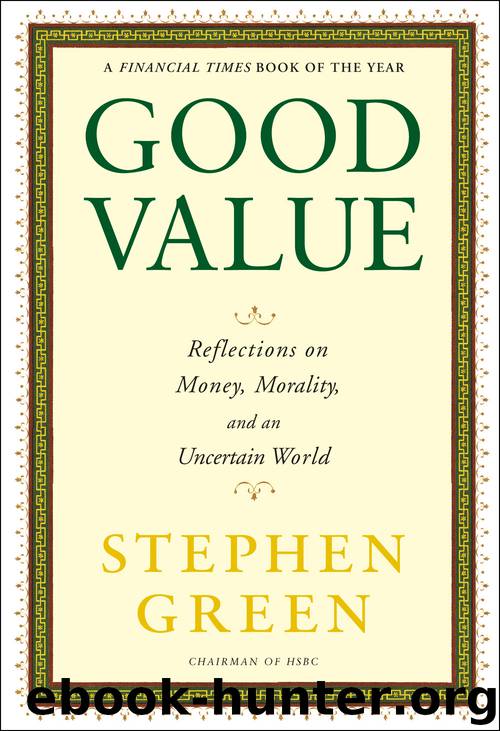Good Value by Stephen Green

Author:Stephen Green
Language: eng
Format: epub
Publisher: Grove/Atlantic, Inc.
Published: 2010-04-13T16:00:00+00:00
To be sure the distinctive aesthetic and romantic experience of nature is perhaps possible only through this process [of becoming remote from nature]. Whoever lives in direct contact with nature and knows no other form of life may enjoy its charm subjectively, but he lacks that distance from nature that is the basis for aesthetic contemplation and the root of that quiet sorrow, that feeling of yearning estrangement and of a lost paradise that characterizes the romantic response to nature.
For example, consider the semimystical contemplation of the cherry blossom that goes on every year in urbanized, crowded Japan. Or the enduring popularity of Pushkin and Shishkin in Russia; or of Constable and Elgar in England—all of them analogous yearnings of urbanized cultures. Simmel could have generalized the point: he might have argued that—to use his own terminology—the emergence of the objective culture as something “over and against” the individual was a fundamental reason why art generally is so much a product of urban life. Art requires distance—psychological distance—from “the other,” not just from nature, as the basis for aesthetic contemplation.
Self-actualization in urban culture can take other forms, too, of course. One, characteristic of mid-twentieth-century European literature, is existentialism. In Albert Camus’s existentialist novel The Stranger (1942), the bored, alienated protagonist, Meursault, struggles to construct an individual system of values as he responds to the disappearance of the old ones. He lives in a state of anomie—the complete loss of belief and purpose—which pervades the book from the opening line: “Today mother died. Or maybe yesterday, I don’t know.” When Meursault is prosecuted for shooting an Arab man during a fight, the prosecuting attorneys seem more interested in the inability or unwillingness of Meursault to cry at his mother’s funeral than in the murder of the Arab, because they find his lack of sorrow offensive. The novel ends with Meursault (defiantly?) recognizing the universe’s “sublime indifference” toward humankind. Meur-sault emerges at the start of the novel as a blunt and unfeeling individual. Ultimately, he accepts the world as essentially meaningless, such that the only way to arrive at any purpose is to make it for oneself. A very urban instinct.
Hermann Hesse’s Steppenwolf (1927) is another classic existentialist text. The “wolf from the steppes” is in fact a middle-aged man named Harry Haller, who is beset with reflections on his being ill-suited for the world of “everybody,” the regular people. He is given a book that describes the two natures of man: one “high,” spiritual and “human”; the other “low” and animal-like. Humanity, it seems, is cursed with perpetual discontent as it struggles blindly between one nature and the other, blind to any alternative possibilities. While Haller longs to break free, he in fact continues to live utterly conventionally as a bourgeois bachelor. He holds that the people of the Dark Ages did not suffer more than those of (an idealized) classical antiquity. Those who are trapped between the two suffer the most. It is hard to find a more striking image
Download
This site does not store any files on its server. We only index and link to content provided by other sites. Please contact the content providers to delete copyright contents if any and email us, we'll remove relevant links or contents immediately.
| Ethics | Etiquette |
| Fashion & Image | Health & Stress |
| Motivation & Self-Improvement | Work Life Balance |
| Workplace Culture |
Tools of Titans by Timothy Ferriss(8393)
Change Your Questions, Change Your Life by Marilee Adams(7780)
Deep Work by Cal Newport(7083)
Playing to Win_ How Strategy Really Works by A.G. Lafley & Roger L. Martin(6301)
Man-made Catastrophes and Risk Information Concealment by Dmitry Chernov & Didier Sornette(6019)
Big Magic: Creative Living Beyond Fear by Elizabeth Gilbert(5771)
Digital Minimalism by Cal Newport;(5764)
Ego Is the Enemy by Ryan Holiday(5445)
The Slight Edge by Jeff Olson(5417)
The Motivation Myth by Jeff Haden(5212)
The Laws of Human Nature by Robert Greene(5208)
Stone's Rules by Roger Stone(5087)
Tuesdays with Morrie by Mitch Albom(4783)
Eat That Frog! by Brian Tracy(4536)
Rising Strong by Brene Brown(4459)
Skin in the Game by Nassim Nicholas Taleb(4248)
The Money Culture by Michael Lewis(4207)
Bullshit Jobs by David Graeber(4190)
Skin in the Game: Hidden Asymmetries in Daily Life by Nassim Nicholas Taleb(4004)
